What Does ‘Attack on Titan’ Really Mean?
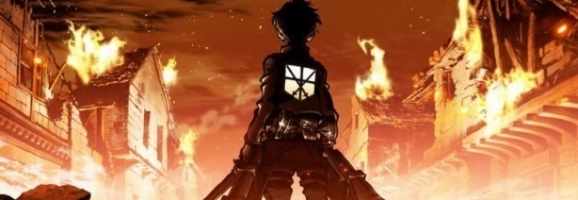
Every anime season, there always tends to be the one that stands out far above the rest with the full force of fan popularity. In the Spring of 2013, it was the dark military drama about humanity on the brink of extinction due to the threat of huge humanoid horrors who mindlessly consume humans, the last of whom are forced to live behind massive walls, called Shingeki no Kyojin (or in English Attack on Titan). It’s not hard to see why this anime has become so popular – our own Justin Wu wrote a piece on those exact reasons. But there are bigger questions concerning this series, the most notable of which is “what does it all mean?” After all, such a startlingly creative and horrifying series is up to interpretation as to its deepest metaphors and crucial symbolism. So here are some of my theories on some possible interpretations of the show as it stands.
Please understand that there may be some spoilers for the anime in this article.
A Metaphor About The Other Side of War
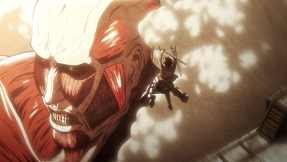 We can all agree that, for the most part, history is written by the winners. Our historical perspective on war comes from whoever was deemed the victor, or at least deemed themselves to be with their influence and power. It’s a lot easier to see ourselves as the triumphant army, on the side of good, than the “others.” But who are these others in the context of modern warfare? What does war looking like from their perspective, as they try to fight an uphill war, out manned, out gunned, and falling fast? Titans, in this light, can be viewed as the enemy occupation, who are stronger and more well equipped than humans, who consume their lives for no good reason – not for hunger (need of resources) but for the seemingly mindless destruction of a people hopelessly outmatched. There are third parties, an endless array of politics, and even different philosophies on war. This metaphor seems the most straight forward as the entire series is about the war between humans and titans, so its not a far leap from war between humans and monsters, and between two set of humans. Even in the story, they mention how foolish humans were for fighting one another, and should have realized how precious life is.
We can all agree that, for the most part, history is written by the winners. Our historical perspective on war comes from whoever was deemed the victor, or at least deemed themselves to be with their influence and power. It’s a lot easier to see ourselves as the triumphant army, on the side of good, than the “others.” But who are these others in the context of modern warfare? What does war looking like from their perspective, as they try to fight an uphill war, out manned, out gunned, and falling fast? Titans, in this light, can be viewed as the enemy occupation, who are stronger and more well equipped than humans, who consume their lives for no good reason – not for hunger (need of resources) but for the seemingly mindless destruction of a people hopelessly outmatched. There are third parties, an endless array of politics, and even different philosophies on war. This metaphor seems the most straight forward as the entire series is about the war between humans and titans, so its not a far leap from war between humans and monsters, and between two set of humans. Even in the story, they mention how foolish humans were for fighting one another, and should have realized how precious life is.
The Hunter/Prey Dynamic
This theory takes a lot from the shows first opening song Guren no Yumiya, meaning Crimson Bow and Arrow. The song begins with the German line, “Seid ihr das Essen? Nein, wir sind der Jäger!” This translates to “Are we the food/prey? No, we are the hunter!” The line reflects the dual role of the main characters in the show who are both the hunters of Titans as well as their prey. Titans are more than just the shows main antagonists, they are also the main mystery. We don’t where they came from, why they ingest people, if there are more efficient ways of killing them, etc. Do they feel pain, fear, hatred, joy? Their behavior is incomprehensible to human beings, making them scarier than other humans. The show is about the role reversal, or at least the attempt at it. As such this can be a show about survival against incomprehensible events or creatures, determined not to be swallowed up by it.
Pulling this idea to its extreme, it could be about not being swallowed by large issues or societies. But Titans don’t represent much in terms of actual issues, though acting as agents of a society that ingest the weak could be one. The other extreme is that the show could be making a commentary on vegetarian-ism. This is super stretching it, and highly implausible, but hear me out. Human in this case represent animals, and Titans represent us. Aa animals, we are the helpless creatures who can fight back but are more likely to be slaughtered, viewing this bigger, constantly smiling creatures, in this case Titans, killing them and ingesting them at a rate that is unnecessary for their own nutrition but just to eat. It’s probably wrong but it is interesting to think about.
The Human Experience
This theory is what I like to call the “Evangelion” theory. For those of you who don’t know, Neon Genesis Evangelion is one of the most well-known and debated series in the anime fandom. Often, some theories associated with the show included that the characters and their situations were representations of mental diseases (depression, anxiety, etc.) or about spiritual or personal issues (self-identity, morality, etc.). As such, this type of explanation can be applied to many different series, including Shingeki no Kyojin. The connection has an extra connection to Evangelion because like the walls of the city, the Eva pilots have a barrier called an Absolute Terror Field (A.T.F) which separates them from the angels, which has been interpreted by many as the barriers we put up around ourselves metaphorically to keep others from both knowing us completely and hurting us.
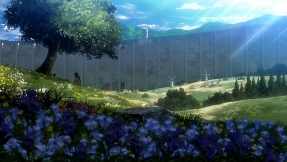 If we look at it from this perspective, Eren Jaeger, the main character, could be viewed as rage, as it is only by feelings of anger and pain fuel his transformation. Mikasa Ackerman, another cadet could be viewed as stoic, since she seems more walled off or emotionally distant, while Armin Alert would likely be anxiety. This is, however, where the larger metaphor for the show being the human experience falls apart, as there are many other characters involved in the series, and not all of them can be representative of emotions/mental illnesses/human conditions. Still, the idea of the wall attacking as a metaphorical barrier as well as a literal one is plausible.
If we look at it from this perspective, Eren Jaeger, the main character, could be viewed as rage, as it is only by feelings of anger and pain fuel his transformation. Mikasa Ackerman, another cadet could be viewed as stoic, since she seems more walled off or emotionally distant, while Armin Alert would likely be anxiety. This is, however, where the larger metaphor for the show being the human experience falls apart, as there are many other characters involved in the series, and not all of them can be representative of emotions/mental illnesses/human conditions. Still, the idea of the wall attacking as a metaphorical barrier as well as a literal one is plausible.
The Power of the Human Will
Willpower in this show is an incredibly important theme in the show, especially because many of the characters spend the majority of their time ignoring their survival instincts and attacking huge monsters whose single mentality is to eat them. This theory goes even further than that, especially when you look at the individual characters. Eren represents the will to kill Titans because that is his only go and keeps him going in the show. His will is a destructive one that is beneficial to society – the warrior’s will. Mikasa, while killing Titans in the show, is less preoccupied by this act but more so protecting Eren, representing the will to protect. While you may think that this is sexist because Mikasa is a female, there are other women in the show that don’t show this same will. Sasha shows the will to eat, i.e. hunger in the literal sense of the term, due to lack of food in her region and Hanji represents the will to learn, or the will to understand, as she performs experiments on captured Titans.
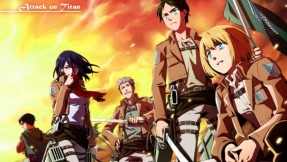 Armin, the least capable of the fighters, also show the will to learn, but he is less interested in understanding Titans the way Hanji is and more so to see the outside world that the Titans have made impossible to see. Connie Springer represents the will to fight in the face of personal fear as he has been represented one of the more frightened characters. In terms of which will he represents, Jean Kirschtein is one of the most difficult to pin down. He is rather stubborn and opposed to fighting, but he has been a noted strategist due to ability to understand weakness. The most accurate fit, I believe, is that Jean represents the will to carry on, the will that does not actively seek to engage in fighting, but will do so out of necessity, and is in fact quite good at it. All of the characters show a desire of some sort surrounding their situation with the Titans, be it active or passive, and all of them share the will to survive. It is these wills, it would seem, that keep our characters stable and moving forward.
Armin, the least capable of the fighters, also show the will to learn, but he is less interested in understanding Titans the way Hanji is and more so to see the outside world that the Titans have made impossible to see. Connie Springer represents the will to fight in the face of personal fear as he has been represented one of the more frightened characters. In terms of which will he represents, Jean Kirschtein is one of the most difficult to pin down. He is rather stubborn and opposed to fighting, but he has been a noted strategist due to ability to understand weakness. The most accurate fit, I believe, is that Jean represents the will to carry on, the will that does not actively seek to engage in fighting, but will do so out of necessity, and is in fact quite good at it. All of the characters show a desire of some sort surrounding their situation with the Titans, be it active or passive, and all of them share the will to survive. It is these wills, it would seem, that keep our characters stable and moving forward.
Duty and Allegiance
The most obvious of the theories concerning the theories is that the show is a thesis on duty and allegiance. These are the two big question put into play at the beginning of the show, especially once the kids begin their training. Eren, in contrast to the beliefs of many of the other cadets, believes that those are the best at fighting should not go to the King’s guard, but go out on the front lines and fight in order to protect the city, if not the survey team that goes out and attempts to find ways to make it to the outer wall. Eren believe those who can fight have the duty of fighting rather than choosing the most privilege position. Jean disagrees – mostly because he does not want to die but also because the King, as their leader, has to remain protected. Mikasa feels her duty is to be with, and protect, Eren out of a sense of love and debt. Ultimately, what does does duty, and what specifically is the duty of the able when the end of humanity is on the line? This is a big question looming in the early episodes of the show, and will resurface as it catches up with the manga.
The theme of allegiance is also a huge topic once Eren’s powers are discovered. Should they swear allegiance to their King, a distant and ultimately useless leader? To humanity? To their commanders? Each other? Themselves? Do they owe it to themselves to survive or give up in their lives in the hope that it will help humanity continue? Does Eren align himself to humans, to Titans, to no one, being able to transform as he can? Who should we pledge our allegiance too, and what is our own personal duty to each other and our world at large? This whole show could be about these interpersonal relationships and how the choices we make not only affect us but the people around us, and even human kind as a whole.
Do you have your own theories?
What do you think? Leave a comment.
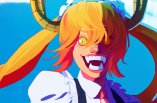
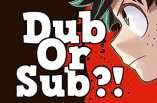
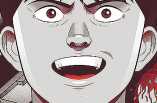
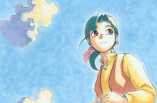
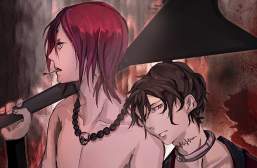
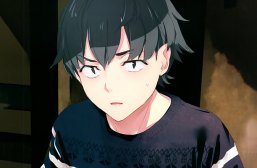
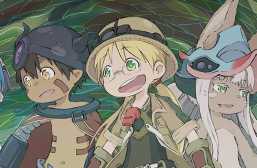
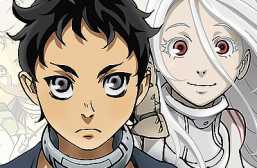
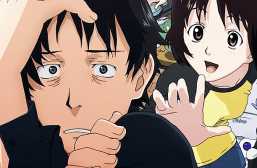
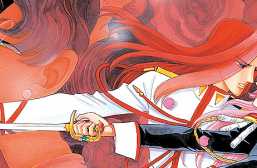
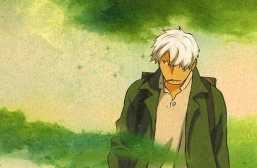
People are going crazy about this in the anime community. To me, this has good story but nothing spectacular.
Cowboy bebop, Code Geass, Phantom: Requiem for the phantom, Monster, Steins;Gate, Rurouni Kenshin – Reminiscence, Kimi Ga Nozomu Eien, Elfen Lied, even FMA to name a few are better than this anime since Berserk debuted.
The first 5 episodes drew attention because of its fast paced nature, gave us the setting for the story, the characters fears and doubts, everything was fine, then, something happened, everything slowed down to a crawl (which is not character development), then two episodes with Armin crying and some mindless chatter on how they are going to do things, then on the next episode they expand on the chatter on how they are going to do things just for them to not do them on that episode either, it just goes on and on so far.
This is generally the problem with anime released with ongoing manga (See FMA first series mess), though, to be fair, the manga started just as slow.
Cowboy Bebop… better than SNK? I think not.
Well you think wrong. Cowboy Bebop was a masterpiece of music and storytelling. There is nothing special about SNK.
Opinions aren’t “wrong”. You just can’t tell someone they think wrong.
Opinions can certainly be totally wrong. Facts can’t.
Are you stupid? Opinions can’t be right or wrong.
Of course it is. SnK is great, though.
Yes, but unfortunately, the whole thing about “Cowboy Bebop” being better is also an opinion. Opinions can’t be wrong nor right, proving that you are (Except Roku here, I’m only replying to you to get to that anonymous coward)mostly ignorant in what you’re saying.
Just stop it ok? Seriously, no one cares which anime is better. They’re all great. I’m an AoT fan myself, but I haven’t watched any ther shows, so I don’t if they’re good or not, and neither have all the haters of both sides. If you think Cowboy Bepop is good, then good for you. We think AoT is good. But we have’t watched Comboy Bepop and you haven’t watched all of AoT, so how do you know? And how do we?
Couldn’t agree more. ITs all hype. This over analysis sometimes the curtains are blue (google this for what I mean) and the fact it isn’t even done writing yet. Makes one wonder if the Japanese know about the LOST TVseries? if so Im not going to bother till its finished. Till then the mystery of the titans will stay that way and frankly from all that I saw, oh well.
This is in no way over analysis. The author is thinking outside the box and bringing up ideas that the reader may not have realized yet. What is wrong with discussing different thoughts and concepts? If you are not open to learning or critical thinking, then you shouldn’t be reading an article about literary themes.
You said that there is “mindless chatter on how they are going to do things”. If you actually payed attention, you would realize that when characters talk about a plan or about what is going to happen, it is not “mindless”. Throughout every moment of the show, the characters and plot move forward, they never stand still. If you could see the themes and details of the show, you would actually be able to appreciate it. You see Armin crying, but you don’t see what caused Armin’s crying. That is one of the things you don’t seem to understand, just to name a few.
Nice theories! I’m current with the Manga and I love it. It does have more conventional trappings as it progresses but there are also plenty of plot twists coming up and the never ending violence with any interaction of Titans. There’s a flashback scene with a lost survey team member that is freaky as anything I’ve read before.
And I love the anime too, but I haven’t watched a ton of the genre so maybe it’s just new to me and old stuff to all you people. I have watched Fist of the North Star, and Hunter X Hunter, Trigun, and some other one-offs or short series. I haven’t seen anything quite like this though.
For a show that’s so highly praised, I want to be a part of it. I want to witness its greatness. Every now and then, Naruto has its amazing fight scenes, Rock Lee vs. Gaara is still one of my favorite Anime fight scenes of all time. But for every great episode of Naruto, there are 100 crappy ones. I don’t want that to happen to this show because it could be amazing, but the pacing is on the verge of Naruto or Bleach. For every amazing thing in an episode, there’s 10 or more minutes of nothing happening except recapping, thinking, rethinking, talking about things we already know, and then recapping all of that again.
There aint no fillers in AoT, kay?
Also AoT never skip the opening theme ohterwise you are not a fan you’re a person who watches just to fake and pretend they like AoT
Just started to watch this yesterday and at first I thought this was going to be some kid show, but I was way wrong. This show is dark! And it has its parts where you really want revenge to happen. Awesome!
Enjoyed the post Sara. I think that it’s going to be revealed that Titans were artificially created, but that the people lost control sometime after the transformation. Love speculating on this…
I didn’t read the manga, so we’ll see how right or wrong I am.
Great article – I’m looking forward to watching the series after reading this.
It’s all actually an exceedingly clever metaphor for the dangers humanity shall face on Saturn’s moon, Titan.
What, i don’t even understand, we would not be able to go there yet, we dont have that technology, and it would be about 4 or 5 years to get there
I think it’s a joke :I
I wouldn’t trust the English title that appears below the Japanese one. A more accurate translation that sounds natural would be “Advance of the Titans.” It’s sad how poorly English is used in Japan with titles and such. Just for the record, I’ve studied Japanese for six years and am living in Japan now.
I’ve never read the manga, but I greatly enjoyed the anime series. Your theories make me want to rewatch the series.
While watching the anime, I definitely felt like it had some commentary on vegetarianism/consumerism, despite not being vegetarian myself. Can someone tell me how/why it is improbable that AoT has no stance on the subject? Perhaps it isn’t an intended interpretation the author meant, but surely it can be read in.
One of my first thoughts was the classic consumerism analogy. Not only does it feature themes similar to some of the original horror films based around this (Romero’s “Of the Dead” series), there’s the very in-your-face concept of “Humanity vs. ______ “. You could fill in that blank with dozens of different things, until you think about all that Titans do: Devour humanity itself.
There’s an insatiable hunger within them, and not even a hunger as they don’t even need it to live. They just consume and will continue to do so until there is nothing left of humanity.
It’s kind of plainly presented.
For me, one of the main messages I took from watching this show is the relationships that develop between soldiers. Most war movies romanticize the camaraderie and brotherhood that develops in the trenches, but they rarely discuss the true effects of war on a soldier. They rarely show you pissing your pants, paralyzing fear that they face, they never show how much they struggle to be honorable and fight for each other rather than just running away in fear. They rarely show you the lasting effects of losing brother after brother in a never ending war. SNK shows all of those things and by showing these weaknesses in otherwise very strong characters, they humanize them.
You are very smart.
I’m convinced the titans are a metaphor for corporations. In the United States corporations are legally “people” but people without morals and only exists to consume and grow as big as possible. The show also deals with a lot of neo-conservative concepts of the powerful having the right to exploit the weak. It seems to be a comment on Ayn Rands book “atlas shrugged” atlas being a figure Greek mythology described as “a Titan who holds up the earth” this to me seems like solid evidence this book played a big influence on attack on Titan. The show can be seen as an attack on that book
This was really interesting to read mi liked the idea of the metaphor of war. There’s so much in attack on Titan and you did a great job of dissecting it. Nice job!
In my personal opinion, the central theme of this anime is the good and bad tendencies in human nature. The titans are metaphorical extrapolation’s humanity’s desire to consume. Their physical size relates to the size of our ambitions. I believe the point of this anime is to show us what it’s like to be on the other side of our destructive nature. In our current society, we destroy forests, ruining habitats and killing thousands of animals, all for our seemingly rational motives. Well the Titans also ruin habits and kill thousands of animals (in this case human beings) for what could be argued as an even more rational reason: hunger. Our outrage at the savage nature of the Titans should correspond to our outrage of our own actions. In that way, a part of our humanity parallels both the Titans and the humans of the show.
SPOILER DO NOT LOOK IF YOU HAVEN’T WATCHED SEASON 3***************
no Titans consume people hoping to eat a Titan Shifter and become human again
I think Jean’s character represents the power of humans to lead democratically, somewhat propogating the idea that there are just natural leaders, born or made from their experiences. He is a leader who knows how to follow and take orders for which he understands the purpose, which is the true sign of a leader. He goes through a few inner struggles common in a leader who has a keen eye for situation analysis and next steps, but wants to be fair and consult with others. But then there is always the issue of urgency and time. And Jean/ John/ Jan (depending on your subtitles lol) seems to always be able to do just enough self-consulting and consulting with others just in time to stay alive.
About 12 hours before reading this article, I explained my no-bug-killing policy (except for earwigs, yuck) to a friend, this time using the show as an analogy (she introduced me to Attack on Titan). She seamlessly understands where I am coming from, so your vegetarianism point resonates with me.
Thanks for being so thorough, I’m glad this is here for other fans who may not see the metaphors while watching… Yet.
ITS JEAN
SPOILERS!!! I thought Attack on Titan was about the top 3% of the income bracket feasting on the bottom 97%, with only the laws (walls) made by the 97% and possibly some of the “good” 3% to protect them, and the start is a “what if” situation of a “Titan” abolishing those laws(When the food industry won the rights in a court case to advertise during certain hours and to kids)
The Titans are flabby dumb white guys with more martial power than everyone else. I think American fans who can’t figure out who they symbolize are lacking in self-reflection.
No, their appearance shows different races.
I liked this article. However, I have to say, I clicked on this article because I expected to get an analysis of the meaning of this awkward English “Attack on Titan” title we have doing on here. Its something that irks me to no end.
I want to point out that I hate the name “Attack on Titan”. It is not a direct translation of the Japanese title “進撃の巨人”(shin’geki no kyojin), which is much closer to something like “Advancing Giants”. I think I read somewhere that the author chose the English translation himself, so this just may be another case of misunderstood English translation, or perhaps the author wanted something memorable – either way, the grammar is very awkward. Nonetheless, it is a title that sticks with you and is easy to talk about with other people.
Yeah he choose it himself. It’s actually Shingeki no Kyojin: Attack on Titan. The Attack on Titan it’s written under the bigger Shingeki no Kyojin. Well at least I saw it like that on original manga
Interesting. Does “advancing giants” have an offensive (meaning “acting towards”) or a defensive meaning (the “giants are the ones advancing”) in Japanese?
“Advancing giants” can only mean: “Giants that are advancing” (at least, in regular English).
Instead of focusing on the story line which may have dozens of possible interpretations you should analyse the anime as anime (pictures, appearances, soundtracks, repeated phrases, the style …..) these elements are what transports a message into your subconscious.
In order to be able to show this message you need to point out these elements and how they define the unique interpretation of the story that you get subconsciously
and that’s not so difficult when it comes to Attack On Titans.
Here is a hint I was conscious about:
The 1st opening : the titans look like families in crisis! some of them look females, and their hands are towards the short ones( the kids! ) and one of the males puts his hands behind his head and screams as if he is under some pain and intense emotions! and this matches the verse about begging and praying!
I think the reason Attack on Titan works so well in our day and age is because of the anime’s air of an unstoppable, impending doom encroaching upon humanity. Nowadays, with our fears of deteriorating public security, terrorism, climate chance, and economic and political instability, there’s this ever present feeling that we live behind walls. The titans in our story are those evils that are pushing mankind towards the abyss, and their ultimate extinction.
A great thinker once said that art is the conscience of society, and I think Attack on Titan makes the statement more true than ever. We fear facing those monsters we hide from, yet we know we have to face them at a certain point. The heroes of Attack on Titan represent our desire to face the challenges.
I personally love the Attack on Titan series, and I can’t wait for new episodes to come out! For me, the movie represents the human fear of the unknown, and also the desire to be more than just what is expected of us in society. In the first episode Eren emphasizes his dislike of being caged like an animal inside the walls and how it isn’t life living that way. Isn’t that something that most lower-middle class people feel? They live pay-check to pay-check, fight on a daily basis to earn as much money as they can just so they can survive, and they fear the next day because they don’t know what it holds or what it may bring for them. Coming from a middle class family, this is what I saw on a daily basis throughout my whole life, and I see it again in this anime. I do agree though with the bigger things bring represented, like those in power bring corrupt, or history being told by the victor. I can’t wait to see how this ends
Well written. I think you are the closest so far. The struggle against the unknown is universal. That struggle with the unknown is universal.
It reminds me of the Rape of Nanjing.
Excellent analysis on the themes in Attack on Titan. I think much can be garnered from the giants’ attacks and the literal consumption of humanity, as well as the predator-prey dynamic.
I think your analysis is essentially correct. I love Attack on Titan- its anime with real messages beyond just people in peril and some action- its conveys real suffering and impending death. I get metaphysical vibes from it as well as there being subtle political commentaries about authority in there. At the end of the day, I think its about war- when it is justified, the idea of humanity coming together to fight a common enemy. The most important line to me is when Commander Pixis is on the wall with Eren telling him the story that Titans were sent so humanity would stop warring with each other
I think Attack on Titan represents the Japanese view of foreigners, especially westerners, destroying Japanesse culture and tradions. This is evident by the titans inability to speak the language and eating everything that represents the country and culture of the people. This is the way I see the shows symbology.
shingeki no kyojin is literally meaning ” Attack Titan” is the type of the titan that Eren could shift into
I think it is a metaphor on mental illness